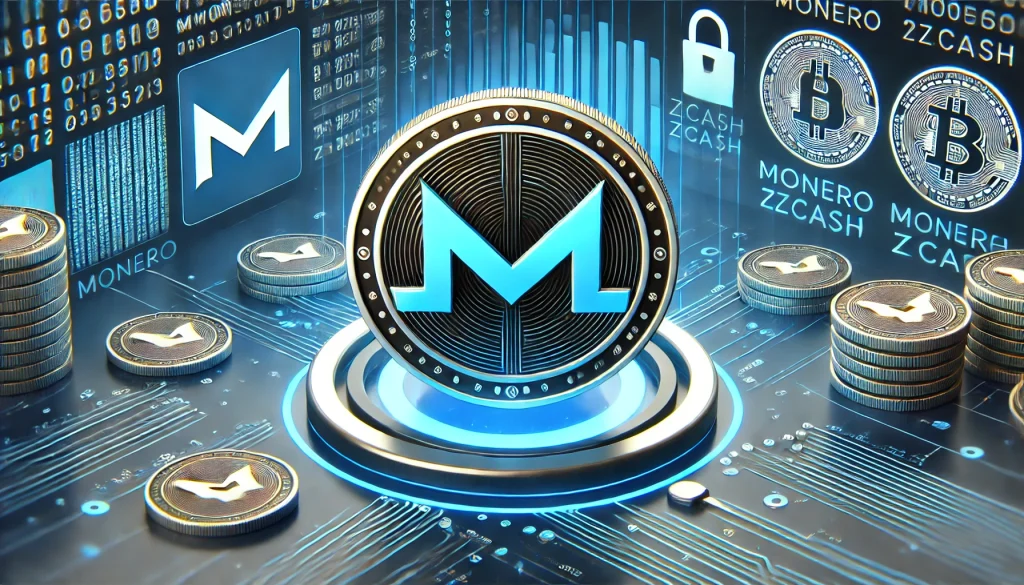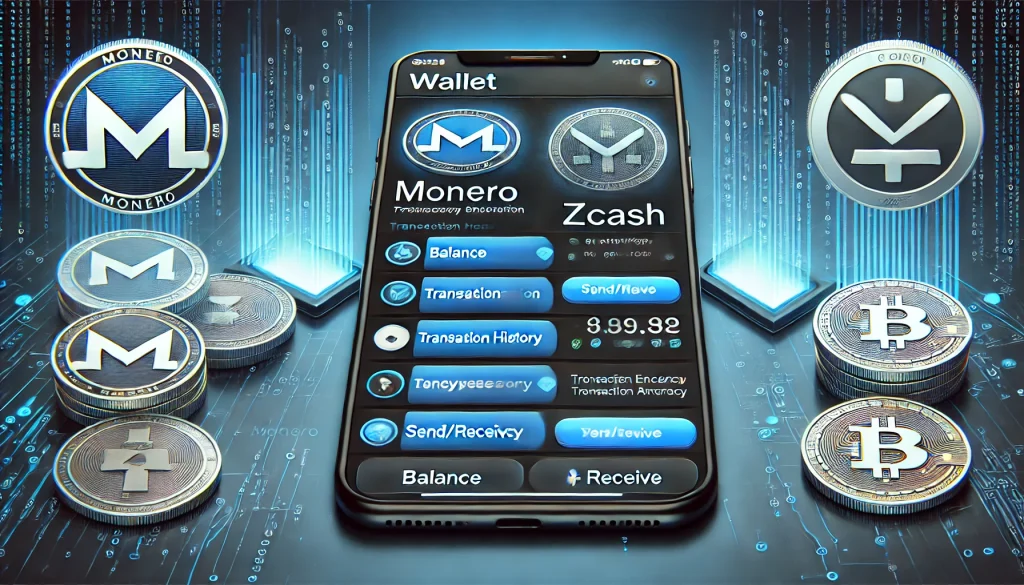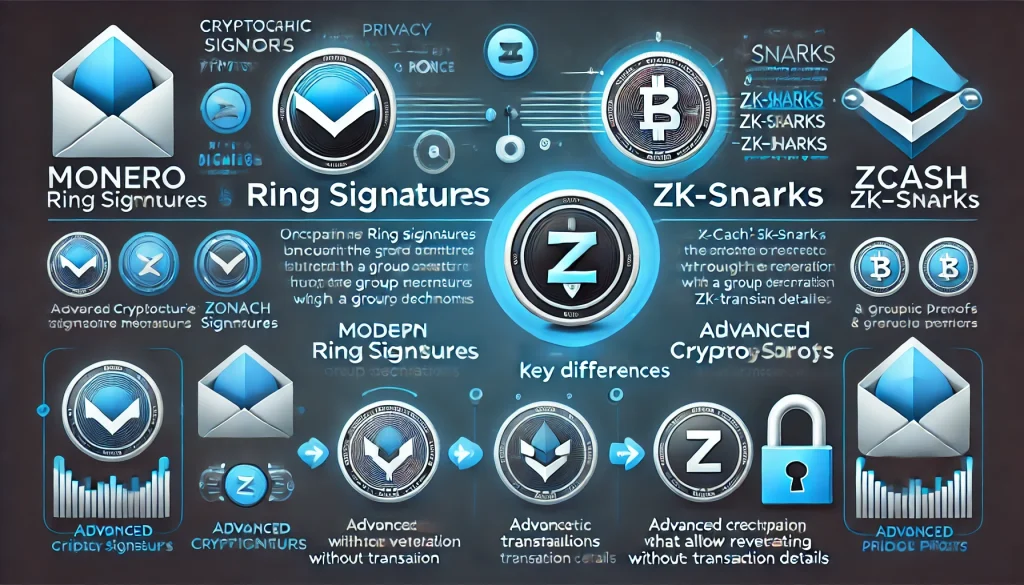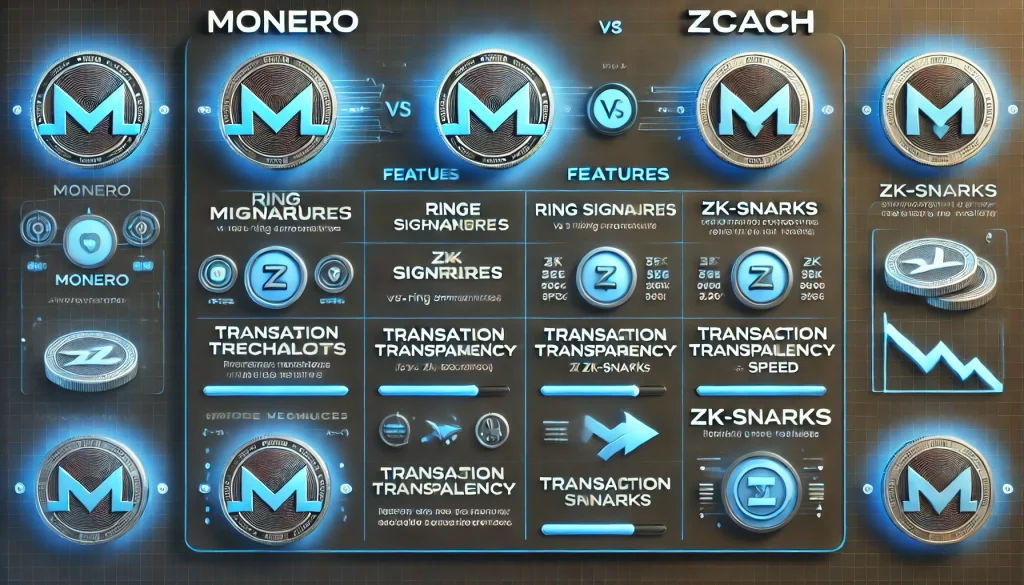
Privacy coins are gaining momentum in the cryptocurrency world as users demand more control over their financial data. While mainstream coins like Bitcoin are pseudonymous, they aren’t fully private—every transaction is traceable on a public blockchain. Monero (XMR) and Zcash (ZEC) are two of the leading privacy coins, offering different approaches to keeping transactions anonymous. In this review, we’ll dive into how both privacy coins perform in real-world use. This will focus on certain aspects such as ease of use, privacy, costs, and future adoption.
Overview of Privacy Coins
Privacy coins are cryptocurrencies that offer enhanced privacy features, allowing users to conduct anonymous and untraceable transactions. Unlike Bitcoin, where transaction details are pseudonymous but traceable on the blockchain, privacy coins hide information like the sender, receiver, and transaction amount. Monero and Zcash are the two most popular privacy coins, each providing different methods to secure users’ privacy. Monero achieves complete anonymity by default, while Zcash allows users to choose between transparent and shielded transactions.
Monero vs. Zcash: A Technology Comparison
Ease of Use

When comparing Monero and Zcash in terms of ease of use, Zcash takes the lead for being more beginner-friendly. Zcash offers users the flexibility to choose between transparent and shielded transactions. This enables them to start with more familiar transparent transfers, similar to Bitcoin. Monero, on the other hand, enforces default privacy on every transaction. This can be beneficial for privacy enthusiasts but requires a steeper learning curve for beginners. Monero wallets like MyMonero or Cake Wallet can seem less intuitive compared to Zcash’s streamlined options like ZecWallet or Exodus. In short, while both coins offer strong privacy features, Zcash’s optional privacy makes it easier for beginners to use, whereas Monero is likely to attract more experienced users who want full anonymity from the start.
Privacy Strength

Monero is widely considered superior in terms of privacy due to its automatic, always-on privacy. Every Monero transaction uses Ring Signatures, Stealth Addresses, and RingCT (Confidential Transactions), ensuring that no third party can trace the sender, receiver, or transaction amount. Zcash, on the other hand, offers optional privacy via zk-SNARKs (Zero-Knowledge Proofs). While Zcash’s cryptography is highly advanced, users need to actively select shielded transactions for privacy, which leaves many Zcash transactions transparent by default. Thus, Monero provides stronger privacy by default, but Zcash’s selective privacy is valuable for users who may want to keep some transactions public, especially in cases where regulatory transparency is necessary.
Transaction Costs
Comparing the transaction costs of Monero and Zcash, Zcash tends to have lower fees, particularly for its transparent transactions, which don’t require the heavy cryptographic computations of shielded transactions. Monero, on the other hand, incurs higher costs due to its complex privacy protocols, which involve processing larger amounts of data to obscure transaction details. For users who prioritize privacy above all else, Monero’s higher fees may be worth it, but for those looking for a balance between cost and occasional privacy, Zcash provides a more cost-efficient solution. Shielded transactions on Zcash are more expensive than transparent ones, but still generally less costly than Monero’s fully private transactions.
Adoption and Support
In terms of adoption, Zcash enjoys broader support across mainstream exchanges and platforms, thanks to its dual transaction system. Its ability to offer transparent transactions makes it more compliant with AML/KYC regulations, leading to fewer delistings from major exchanges like Gemini and Kraken. Monero, however, has a reputation for being the go-to choice in privacy-focused communities, particularly on darknet markets, where privacy is crucial. Monero’s non-optional privacy has caused several regulated exchanges, including Coinbase and Binance US, to delist it. In contrast, Zcash attracts businesses and users who prefer flexible privacy options, but Monero remains the go-to choice for those who prioritize complete anonymity.

| Aspect | Monero (XMR) | Zcash (ZEC) |
|---|---|---|
| Privacy Method | Ring Signatures, RingCT, Stealth Addresses | Zero-Knowledge Proofs (zk-SNARKs) |
| Transaction Privacy | Default privacy for all transactions | Optional privacy (shielded vs. transparent) |
| Transaction Fees | Higher due to cryptographic complexity | Lower, especially for transparent transactions |
| Adoption | Strong in privacy-focused communities | Broad adoption across both privacy and business sectors |
Use Cases for Monero and Zcash
Monero Use Cases
Monero is best suited for users who prioritize complete anonymity in every transaction. Common use cases include:
- Private payments between individuals.
- Private donations to organizations that prioritize anonymity.
- Transactions in privacy-focused communities, such as darknet markets or private wealth transfers.
Zcash Use Cases
Zcash is ideal for users who want flexible privacy options. It’s commonly used in:
- Anonymous charitable donations, where both privacy and transparency may be required.
- Business transactions that need selective transparency for auditing or regulatory reasons.
- Decentralized finance (DeFi) applications, where privacy is increasingly important.
Regulatory Challenges
Both Monero and Zcash face regulatory scrutiny, but Monero is under greater pressure because its privacy features are non-optional. Monero’s default privacy makes it difficult for regulators to trace transactions, which has led to delistings from major exchanges. On the other hand, Zcash’s ability to offer transparent transactions makes it more compliant with regulatory standards. However, it may still face challenges as governments tighten cryptocurrency regulations.
Countries like the U.S. and Japan have introduced measures to delist or ban privacy coins from regulated exchanges. In the European Union, upcoming regulations could further impact the use of privacy coins. Both Monero and Zcash will need to adapt to survive in this increasingly regulated environment. Furthermore, their development teams are actively exploring solutions to maintain privacy while meeting legal requirements.
Final Verdict: Which Privacy Coin is Better?
For users who need complete, default privacy, Monero is the clear choice. Its automatic anonymity ensures that every transaction is untraceable. This makes it ideal for users who don’t want to worry about adjusting privacy settings. However, its higher fees and the risk of delisting may pose challenges for some users.
Zcash is the better option for users who want flexibility. Its ability to switch between transparent and shielded transactions makes it more accessible to a wider audience. This includes businesses and institutions that may need transparency for compliance. Zcash’s lower transaction fees and broader adoption make it an appealing choice for those who want privacy without sacrificing usability.
Conclusion
Monero and Zcash are two of the most advanced privacy coins available today, but they cater to different needs. Monero offers unmatched privacy for those who prioritize anonymity above all else. Zcash strikes a balance between privacy and transparency, making it more versatile for both individual users and businesses. As privacy concerns grow and regulations evolve, both coins will continue to play significant roles in the cryptocurrency landscape.
FAQ
What is the key difference between Monero and Zcash’s privacy features?
The main difference lies in how privacy is implemented. Monero provides default privacy for all transactions using techniques like Ring Signatures and RingCT, ensuring that every transaction is private. In contrast, Zcash offers optional privacy through its zk-SNARKs technology. This allows users to choose between shielded (private) and transparent (public) transactions.
Which privacy coin is easier for beginners to use—Monero or Zcash?
Zcash is generally more beginner-friendly because it offers the flexibility of transparent transactions, which are simpler and resemble Bitcoin transactions. Monero, while providing full privacy by default, requires a bit more familiarity with privacy tools, resulting in a slightly more complex user experience for new users.
Are Monero and Zcash affected by cryptocurrency regulations?
Yes, both Monero and Zcash face regulatory scrutiny due to their privacy features. Monero, with its default privacy, has been delisted from several exchanges due to concerns over its use in illicit activities. Zcash faces fewer issues because it offers transparent transactions, which make it more compliant with AML/KYC regulations. However, it may still face challenges as governments introduce stricter regulations.
Resources
- Arctic Wallet. Comparing Privacy Coins: Monero vs. Zcash
- BitDegree. Zcash vs. Monero
- SimpleSwap. Monero vs. Zcash
- OriginStamp. Monero vs. Zcash: What’s the Difference?
- Guarda. Monero vs. Zcash vs. Dash
